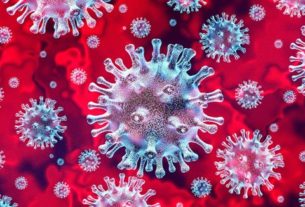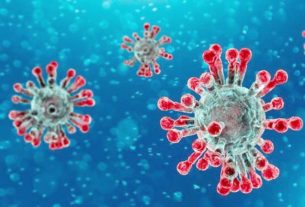From Our Bureau
21ST JULY 2020
The Corona Virus (COVID-19) pandemic situation remained grim globally, with the confirmed cases across the world soaring to 1,45,62,550 and the death toll rising to 6,07,781 in the 216 affected countries and territories, according to the latest update from the World Health Organization (WHO).
Globally, American region continued to be the worst-hit with 77,02,075 confirmed cases and 3,11,569 deaths. Europe came next with 31,03,674 confirmed cases and 2,07,958 deaths. South-East Asia region’s tally stood at 14,78,141 confirmed cases and 35,121 deaths.
Eastern Mediterranean region reported 14,00,544 confirmed cases and 35,145 deaths. African region registered 6,11,185 confirmed cases and 9,898 deaths. Western Pacific region recorded 2,66,190 confirmed cases and 8,077 deaths. WHO Risk Assessment at global level remained very high.
In his regular media briefing, WHO Director-General Dr Tedros Adhanom Ghebreyesus reiterated the importance of contact tracing in all communities affected by COVID-19, stating that “No country can get control of its epidemic if it doesn’t know where the virus is.”
A South African hospital has developed an innovative solution to boost COVID-19 testing. Staff in the Westfleur Hospital, a public facility in the Western Cape, are refashioning security booths into makeshift COVID-19 testing centers.
The Istanbul Center, run by the WHO Country Office in Turkey together with the Turkish Ministry of Health, improved access to health services for Syrian refugees using online services to provide psychosocial health support, as part of reinforced preventive measures against COVID-19.
Countries in the WHO Eastern Mediterranean Region are restarting essential polio immunization campaigns under strict COVID-19 infection prevention and control measures, with Pakistan being the first country to resume campaigns. Other countries in the Region are in the early stages of planning to resume vaccination campaigns when the local epidemiological situation permits.
Subject in Focus :
Update on partner coordination
Emergency medical teams (EMT)
As of 17th July 2020, the EMT network has facilitated a total of 33
international deployments, over half of which are currently ongoing.
In the African Region, The Alliance for International Medical Action (ALIMA) is supporting operations in Senegal, Burkina Faso and Cameroon. Malteser Germany have finalized assessments of COVID-19 operational support needs in Yaounde and Douala in Cameroon. In addition, the EMT network continues to operate and support operations in Burkina Faso, Chad, Senegal, Ghana, South Sudan, and Zambia.
In the European Region, the EMT Regione Piemonte (Italy) has completed a two-week mission to support the national surge capacity in Armenia. To ensure continuity, International Search and Rescue (ISAR) Germany have arrived to continue this work in country.
In the Region of the Americas, national operations continue to be critical to the response, with almost 180 EMTs deployed using the EMT methodology. Elément de Sécurité Civile Rapide d’intervention Médicale ESCRIM France continues to operate in French Guiana. The efforts of the deployed EMT teams are focused on the direct clinical care of patients, surge capacity and technical support to adapt triage and isolation areas, inpatient wards and overall re-organization of hospitals to assist the COVID-19 response.
The EMT network has provided more than 1,800 beds in Chile to increase capacity at health facilities; it has also provided 1,637 beds in Bolivia, and 1,422 beds in Peru. These beds were provided through the EMT Network. As of 17th July 2020, a total of 8,330 beds have been managed or supported by the EMT network in the region.
More than 150 existing facilities have been repurposed for treatment using the EMT technical standards. Finally, coordination structures have been supported in 57 countries with EMT focal points, senior staff and experts mobilized from the roster of members trained in EMT coordination and mentorship methodology.
In the Western Pacific Region, the New Zealand Medical Assistance Team (NZMAT), together with the EMT Secretariat and partners, piloted a remote exercise management system which enables EMTs to conduct remote simulation exercises. This pilot will help to build and inform the future remote exercise simulations for experts and teams in the network who are currently responding to COVID-19.
The Global Outbreak Alert and Response Network (GOARN)
GOARN partners and networks continue to provide technical advice across all health operation pillars, particularly clinical management, Infection Prevention and Control, laboratory and risk communication and community engagement (RCCE).
As of 17th July 2020, 585 offers of support from 50 GOARN Partner institutions have been received, 85 have been deployed. Operational factors that have a major impact on the deployment of international support include heavy travel restrictions and quarantine requirements related to international travel.
WHO, GOARN partners and stakeholders continue to collaborate on the rollout and implementation of Go.Data. Go.Data is a field platform for collecting and analyzing key data for case investigations, for contact tracing and follow-up; and for generating chains of transmission.
The Go.Data team has responded to over 450 requests, and is supporting over 55 projects worldwide to implement Go.Data. The team continues to conduct virtual trainings and briefings, provide user support for epidemiology, analytics, interoperability and IT. In addition, recently launched Go.Data community of practice is becoming the main channel of communication within Go.Data users and a resource for latest information and documentation.
Risk Communications and Community Engagement (RCCE)
The main outputs from the RCCE collaboration include: RCCE strategy is being updated to address next 6 months of the response, aligned to Strategic Preparedness and Response Plan and Global Humanitarian Response Plan.
Three broad areas of misinformation, rumors and concerns have been identified based on community feedback and media monitoring data: treatment options, impending second wave and modes of transmission and protective behaviours and use of masks.
RCCE Collective Service Governance and functioning has been finalized and endorsed by the steering committee. GOARN will provide strategic, operational and technical support and guidance, as well as surge capacity and strong links with the training and social science research networks.
As part of a phased approach, two regional collective service hubs in African continent (West/Central and Eastern/Southern) are being strengthened with dedicated staff. This is building on the strong coordination systems creates. 4Ws- Who, What, Where, Why- mapping on going in both regions.
The interagency Risk Communication and Community Engagement (RCCE) technical working groups in East and Southern and West and Central Africa have developed new guidance developed on community led interventions for COVID 19.
A brief to inform the best approach to RCCE for contact tracing brief is being developed as a follow-up to WHO/GOARN contact tracing consultation.
Ongoing work on community perceptions to contact tracing in new survey being conducted in 27 countries by Imperial college (UK) and WHO.
RCCE webinar- ‘Listening to community feedback: a discussion on how to better close the loop and inform action’ will take place on 5th August at 11:00 AM Geneva time. Additional information is available on the GOARN knowledge platform for COVID-19 to share resources from partners and other stakeholders. (eom)


